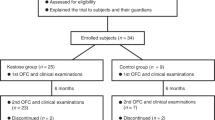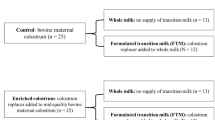Abstract
The growth, development and health conditions for children living under deprived conditions in developing countries are so adverse that immediate public health measures to reduce morbidity and improve nutrition are urgently needed. Preventing and shortening the course of diarrhoeal episodes, eliminating protozoal colonization, and balancing intestinal microflora would all contribute to these goals. The consumption by humans of part of the colostrum produced when a dairy animal gives birth is an established tradition in many traditional societies. Recent advances in food technology in industrial dairying allow for continuous availability of stabilized bovine colostrum concentrate, both natural and hyperimmunized against specific human pathogens. This is safe for the calves of the producers themselves, for laboratory animals, and generally for humans, with the caveat of the milk-allergic. Moreover, substantial amounts of orally ingested bovine colostrum concentrate survive their passage through the stomach to remain intact and active in the lower reaches of the bowel. Studies in animals, human volunteers and naturally infected humans have demonstrated a therapeutic efficacy of oral bovine colostrum with certain infections. Similarly, attempts to prevent gastrointestinal infections in animals, exposed volunteers and at-risk populations have met with limited success with specific pathogens. It is time to begin to assess the feasibility and potential effectiveness and efficiency of employing seasonal or chronic bovine colostrum feeding in populations of deprived infantile populations to reduce the rates of recurrent gastroenteritis and decrease immunostimulation to improve vitality and nutritional status in early life.
This is a preview of subscription content, access via your institution
Access options
Subscribe to this journal
Receive 12 print issues and online access
$259.00 per year
only $21.58 per issue
Buy this article
- Purchase on Springer Link
- Instant access to full article PDF
Prices may be subject to local taxes which are calculated during checkout
Similar content being viewed by others
Author information
Authors and Affiliations
Rights and permissions
About this article
Cite this article
Solomons, N. Modulation of the immune system and the response against pathogens with bovine colostrum concentrates. Eur J Clin Nutr 56 (Suppl 3), S24–S28 (2002). https://doi.org/10.1038/sj.ejcn.1601480
Published:
Issue Date:
DOI: https://doi.org/10.1038/sj.ejcn.1601480
Keywords
This article is cited by
-
Gut priming with bovine colostrum and T regulatory cells in preterm neonates: a randomized controlled trial
Pediatric Research (2021)
-
Effect of different feed ingredients and additives on IPEC-J2 cells challenged with an enterotoxigenic Escherichia coli strain
Cytotechnology (2016)
-
Preventively enteral application of immunoglobulin enriched colostrums milk can modulate postoperative inflammatory response
European Journal of Medical Research (2013)
-
Alteration of DSS-mediated immune cell redistribution in murine colitis by oral colostral immunoglobulin
BMC Immunology (2013)



